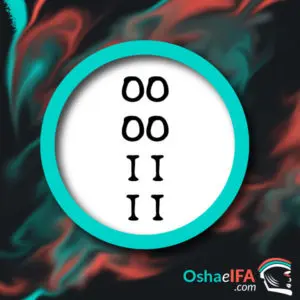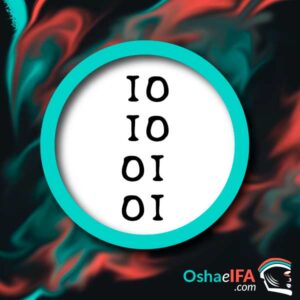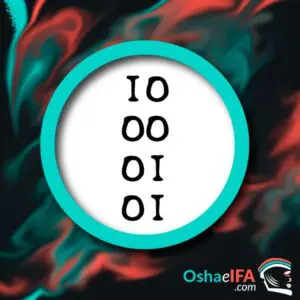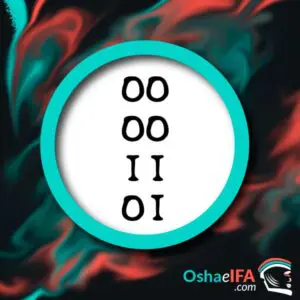Ojuani Ogunda (Òwónrín Ògúndá)
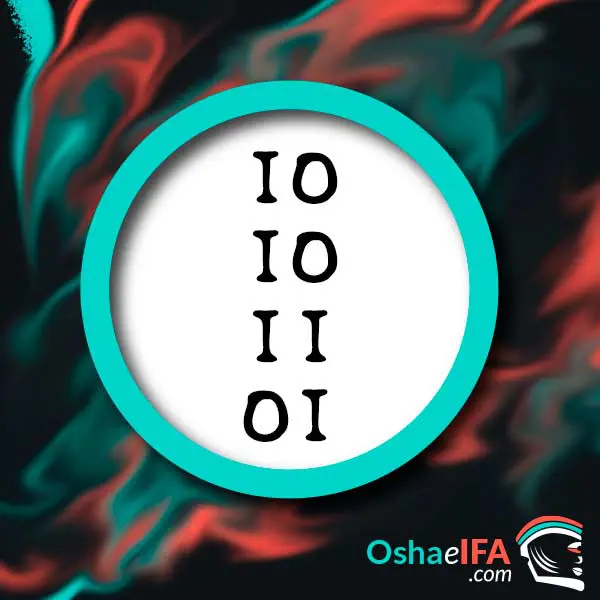
Ojuani Ogunda (Ojuani Dawan) is an Ifá sign that belongs to the book of Owonrin and occupies place number 99 in the hierarchy of the Odu. According to the teachings of Orunmila, enjoying love towards God, Olodumare, is one of the most essential priorities in life. This divine love is considered even more fundamental than the love towards our fellow human beings.
General Analysis of Odu Ojuani Ogunda
Ojuani Ogunda is a sign of duality and conflict. This Odu reveals the existence of significant challenges in the field of business and home. It is characterized by involving the person in seemingly indomitable conflicts where it is crucial to know when to withdraw to avoid greater losses. In the economic context, this Odu suggests that despite obstacles, there is possibility of economic gains through the Saints, symbolizing that appropriate efforts and sacrifices can lead to prosperity.
Health Aspects:
In terms of health, Ojuani Ogunda warns of serious stomach problems, heart attacks, tetanus, rabies, strokes, drowning, poisoning and burns. The need to pay attention to your diet and the way you consume food and drinks is crucial to avoid complications. He emphasizes the importance of feeding the head (Kobo-Ori), a ritual that refreshes luck and protects the spiritual and physical health of the individual.
Religious Aspects:
This Odu is rigid regarding respect and observance of religious practices. It underlines the need to respect the Babalawos and Orunmila, and to fulfill spiritual debts, especially towards Azojuano (San Lázaro). In addition, it recommends specific offerings to Eshu-Elegua to maintain harmony and avoid negativity, using jutía, smoked fish, toasted corn and corojo butter. These acts not only reinforce the spiritual connection but also promote protection and well-being.
Personal Relationships (Love):
In the area of love and personal relationships, Ojuani Ogunda warns about envy within the couple and the family circle. She points out specific problems, such as forced marriages and the desire to hide unwanted pregnancies. Honesty and open communication are essential to avoid tragedies and misunderstandings that could arise from unrevealed secrets. The relationship between husband and wife, where both must feed their heads (Ori) and dress in white, is crucial to maintain luck and protect themselves from adversity.
Important Metaphors and Symbols:
The figure of the pretty boy looking out of the window symbolizes the innocence and hidden beauty that we all carry within us but that is often hidden by the vicissitudes of life. The use of scissors born in this Odu implies the need to cut with the past or with situations that no longer serve us, a symbolic act of renewal and liberation.
General Characteristics of the Odu Ojuani Ogunda
Names and Aliases:
- Ojuani Ogunda.
- Ojuani Dawan.
- Ojuani Gunda.
- Ojuani Daguan.
- Òwónrín Ògúndá.
What is born in the odu of Ifá Ojuani Ogunda?
- The secret of Igba Odu (Olofin).
- Scissors.
- The crowning of Oshun on the heads of Oba's children (Oshun with gold for Oba).
- That only the Babalawos have the right to receive Igba Odu (Olofin).
- Ojuani Ogunda talks about the two Egun of Olofin.
- Mark debt with Azojuano.
- You have to take care of the candle.
- It is where the guilt of love for disobedience is paid.
What does the Ojuani Dawan sign talk about?
- Talk about the pretty boy who looked out the window.
- Talk about hiding something.
- The virtue the person has in the hands.
- Elegua gently caressed Oshun with her hands and she fell asleep.
- He who does not look forward is left behind.
Point out:
- There is bad talk of the Babalawos.
- Beware of kneeling and animal bites.
- It feeds the head.
- There is lack of respect with the Saints.
Recommendations:
- Make Ebó: It is essential to perform purification sacrifices to avoid conflicts and lawsuits, especially before important visits or in times of difficulty.
- Respect and honor the Babalawos and Orunmila: Since this Odu emphasizes respect towards spiritual leaders and ancestors, it is crucial to maintain an attitude of respect and deference towards them.
- Take care of offerings to saints and deities: Specifically, make regular offerings to Eshu-Elegua with smoked jutía and fish, toasted corn and corojo butter to maintain protection and spiritual guidance.
- Dress in white: Women are recommended to wear white for 10 days to protect themselves from envy and bad energy.
- Be careful with food and drink: You must be especially careful with what you consume to avoid poisoning or suffocation.
- Frequent change of clothes: Change clothes often to avoid being recognized by enemies on the street.
- Remember and consider dreams: Dreams can contain important messages and warnings that should not be ignored.
- Feed the head: This act strengthens luck and spiritual protection, and should be done by both the individual and their partner.
Prohibitions:
- Avoid unnecessary conflicts: Conflicts at home, work or with friends should be avoided as they can lead to loss of luck and serious health problems.
- Do not speak ill of the Babalawos: A language and attitude of respect towards spiritual leaders must be maintained, since speaking ill of them can have negative consequences.
- do not reveal secrets: Maintain discretion about personal and spiritual matters to protect yourself from the bad intentions of others.
- Take care of the candle: Avoid contact with open fires and situations where fire is present to avoid accidents and burns.
- Avoid disobedience in love: Disobedience in love affairs can lead to severe consequences according to this Odu.
- Do not neglect spiritual debts: Especially debts with San Lázaro (Azojuano) must be settled to maintain harmony and protection.
- Caution with animals: You should be careful with animal bites and stings that can lead to illness or infection.
- Avoid recklessness on the street: Recklessness can lead to personal tragedies or involvement in other people's tragedies.
You may also like: Treaty of the sign Ojuani Meyi
Sayings of the Odu of Ifa Ojuani Dawan (Ogunda):
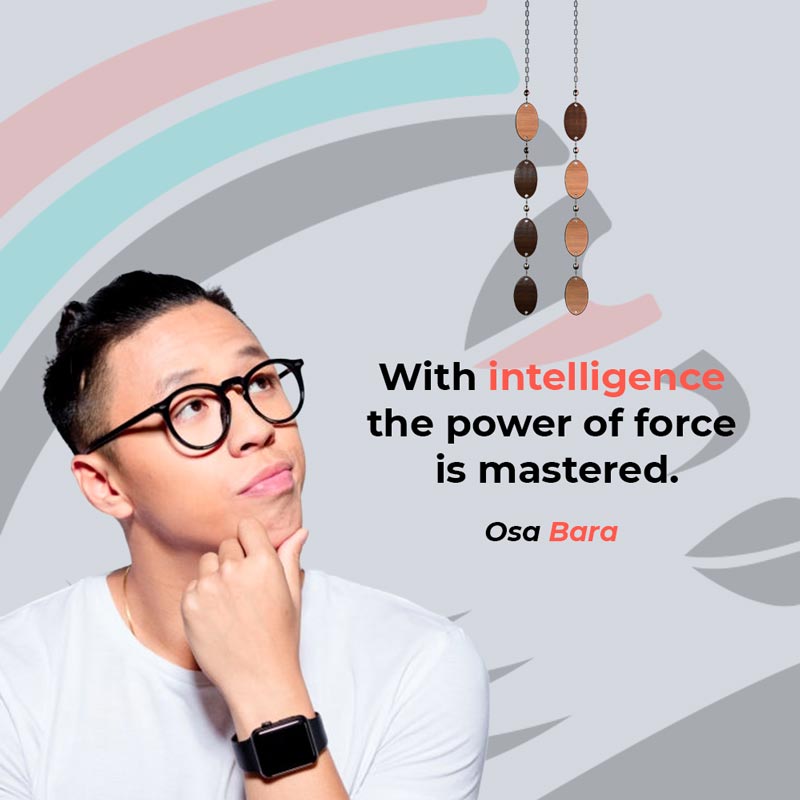
- You throw the stone and the people take the blame.
- Olofin was lost because of a woman.
- Don't go to anyone's house, so you don't know about anyone.
- If a child opens a boiling pot, he covers it again because of the heat.
- I paid the guilt of my love, for disobedience.
- He who does not look forward stays behind.
- Evil eyes that watch, secrets revealed.
"One throws the stone and the people take the blame" illustrates how the actions of one individual can negatively impact an entire community. This saying highlights the importance of personal responsibility, as the consequences of irresponsible acts often fall on the innocent, spreading injustice and misunderstanding.
Ethical code:
- The Awó who does not look ahead, stays behind.
Meaning of the oddun of Ifá Ojuani Ogunda:
«Ojuani Dawan is the most powerful Ifá sign that exists after the 16 Mejis of Ifá. Ojuani Ogunda can never be defeated on earth. When the Awó faces conflicts, this Odu grants him victory, enshrining him on the board."
In Ojuani Ogunda, the person must remember their dreams, because this is where scissors were born.
In your home, there is someone in whom you have placed great trust and to whom you trust everything; Be careful to avoid possible failure with this person. You should avoid arguments at home, at work or with friends, as they could lead you to lose your luck or even suffer a heart attack or stroke due to the stress caused.
It is crucial to feed your head so that luck comes to you fresh. Within this Odu, both spouses and family members can experience mutual envy.
Ojuani Ogunda predicts the death of a family member within the year; Be careful, it could be you. Perform Ebó and offer thanks to Obatalá, Elegua, Ogun and the woman.
You must be especially careful with fire for this Odu. Also, be careful with what you eat or drink and do it slowly to avoid choking.
The man should be cautious with problems related to women; Although he feels strong and powerful, he could face dangers such as being attacked with hot substances. The payment for the guilt of love due to disobedience is reflected here. Furthermore, the man will be forced to get married.
The woman may want to hide an unwanted pregnancy. There is a deity or a spirit who will discover something that, although not hidden, she wishes to hide.
This Ifá also indicates lack of respect towards the Saints and there is a danger of blood being shed. The virtue of the person resides in their hands, like when Elegba caressed Oshun, leaving her drowsy, which caused Orunmila to envy.
This sign emphasizes the importance of looking forward so as not to be left behind. Before going out into the street, Elegba should be offered smoked jutía and fish, toasted corn and corojo butter.
In addition, the spirit of the Father must be fed with a banana, placing two coconuts, brandy, nine olelé, nine ekrú and nine pieces of ekó. The banana is then cooked and taken where indicated along with the coconut.
When this Ifá speaks of "Intori Arun", it refers to two things: money and illness. Predicts economic good through the intervention of the Saints.
For this Ifá, the Babalawos must be respected and not speak ill of them. Keep your secrets, beware of puncture injuries and bites during sexual intercourse. Death visits his house.
Ifa says in Ojuani Ogunda:
- Verbal respect and caution: Maintain respect towards the Babalawos and do not speak ill of them.
- Family relationships: Be obedient to your brother who lives in the country to avoid more deaths in the family within the year.
- Rituals and precautions: Perform Ebó if you want to win a lawsuit and avoid getting wet that day, since it will rain.
- Protection and clothing: Wear white for ten days to attract good luck, especially since it is related to a woman.
- Beware of witchcraft: Witchcraft is working against you; Keep your secrets and do not divulge them.
- Home security: Be careful in your home against accidents such as kneeling or animal bites.
- Consultation and discretion: Consult other people about your important matters and keep your secrets well kept.
- Spiritual respect and consequences: He is disrespectful to the saints, which could result in severe consequences, such as bloodshed.
- Spiritual Nutrition: Feed your head to ensure that luck comes to you fresh.
- Makeover: Change your clothes frequently to avoid being recognized by your enemies.
- Avoid conflicts: Avoid arguments at home, work or with friends to maintain your luck and avoid serious health problems.
- Additional precautions: Be careful with fire and what it consumes; eat and drink slowly to prevent choking.
- Realism in desires and expectations: Recognize what is impossible to obtain and adjust your expectations accordingly.
When the Ojuani Dawan sign appears in divination:
- This Ifá sign indicates difficulties in business and at home. The person will be involved in a conflict that they cannot win and must cut their losses.
- When this Odu emerges during a divination, the person who consults usually speaks badly of the Babalawos and does not show respect towards Orunmila.
- This Ifá reveals that the person has relatives in the countryside and, before visiting them, they must perform Ebó to avoid conflicts.
- When this Odu appears in Osobo for a sick person, the person will not recover.
- If the godson and the godfather perform Ebó together, it will surely rain, but they must avoid getting wet; otherwise, they will suffer losses.
- It is crucial to be alert to possible tragedies on the street or getting involved in other people's tragedies.
- The person could be being affected by witchcraft (Ogu), so they must be careful with what they eat and drink to avoid being poisoned or sick.
- Elegua should be offered cheese with sweet guava.
You may also like: Ifa Ogunda Leni sign
Prayer of the Odu Ojuani Ogunda:
OJUANI OGUNDA APATAKIN IMALE ALA KAIYE OSANYIN GBOGBO IMALE OLOFIN ASHORO EGUNGUN AWO UMBO ASHIRE ILE IFA IGBO ORUN OBINTIN BIDOJU ASHIRE ORUN ANONA ONSHE TERU SILE APETE ORISHA GBOGBO KALENU OMO KOLAGBA OBINI OJUANI NI OSI ADIFAFUN ORUN MABINU AYODE LAYEDE EPA OBINI OLOFIN ISHE AYEDE ILE OLOFIN ORISHA KAFEREFUN OLOFIN LODAFUN EGUN MEJI.
Suyere (song):
AWO ENIRE ENIFA OLOFIN MODUPUE FOBAE IRE LAYEO
Works of Odu Ojuani Dawan:
Ebbo to resolve disputes:
- Ingredients: 1 rooster, 2 drums, 2 pigeons, 1 mouse, several additional ingredients, and a considerable amount of money.
- Important Note: During the ritual, neither the godfather nor the godson should get wet in the rain. It is expected to rain that day and getting wet could result in significant losses.
Works for Eshu:
- A chalk knife will be prepared with black and white thread, ending with seven knots.
Ebo for the Egun of the Father:
- Offering: Offer a banana accompanied by two coconuts, brandy, ashé, 9 olelé, 9 ekrú and 9 pieces of ekó.
- Procedure: Cook the banana after the ceremony and place it in the offering. Consult through OBI OMI TUTO (fresh coconut) about the appropriate location to take the offering, specifically asking if it should be taken to a coconut bush.
You may also like: Treaty of the Sign Oshe Sa
Pataki of the sign of Ifa Ojuani Dawan:
The boy with the cute face
A man had a small and very beautiful son who used to look out on the balcony of his house to look at the moon. One night, the father accompanied the boy and asked him:
—Why do you look at the moon so much?
"The moon talks to me," answered the boy. He told me that my father will want to pour water on my hands and I will refuse.
The father, confused and worried, shared this conversation with his wife, who interpreted that they would be destined to serve his son. Believing that the best solution was to avoid that fate, he suggested getting rid of the child by throwing him into the sea.
This is what the father did. But, at that moment, a sea bird caught the child and took him to a distant land. Three days later, the bird was hunted and, when it opened, the child was found safe and sound inside its beak. The Obá of that land, upon seeing the child, decided to adopt him and raise him as his own.
At the age of seven, the Obá performed an Ifá for the child, revealing the Odu Ojuani Ogunda. When the boy turned 21, his adoptive father gave him money and advised him to travel to learn more about Ifá.
Meanwhile, the biological parents, broke and regretful, had moved to another land and opened a business. Without knowing it, Ojuani Ogunda arrived at that place and stayed at his establishment. When his biological father tried to wash his hands, Ojuani Ogunda refused, which shocked his father. When asked about his reaction, the father told him the story of his lost son. Ojuani Ogunda, intrigued, consulted the Obá, who confirmed his true identity.
The merchant, upon learning that Ojuani Ogunda was his son, wanted him to live with them. However, the Obá instructed that they should move to his house and receive Ifá as part of his redemption, since his son was a Babalawo.
Explanation: This story illustrates how impulsive, fear-motivated decisions can lead to long-lasting and painful consequences. The parents, trying to avoid a fate they considered humiliating, ended up losing their son and falling into misery. However, fate, in its mysterious way, guided the son back to them, not only to reconcile but to elevate them to a life of greater spiritual significance. This patakie teaches us that love and redemption are possible even after big mistakes, and that often, fate has bigger plans for us than simply escaping what we fear.
Ojuani Ogunda Ifa Traditional Nigerian
ÒWÓNRÍN ÒGUNDÁ
Orún ni wóón dájo Ilá
Ìtàdógún ni wóón nájà lÉrìn
Òsùmàrè níí mójú Olórun oba sàbá kòòrò kooro
A day fún eni èèyán fé
You Olórun obá ò fé
A day fún eni èèyán kò
You Olórun Obá fé
Wón ni ebo ni kí wón o se
Won't he
Eni ti Olórun bá fé ni n jayé
Àwon èèyán sì n bínú è
Báyòówù kí àwon èèyán se tú
Orí eléyìun or tèlé e
hey hey
Ní wá n jó n ní n yò
Ní n yin àwon Babaláwo
Àwon Babaláwo n yin Ifá
Ó ní béè làwon Babaláwo tòún wí
Orún ni wóón dájo Ilá
Ìtàdógún ni wóón nájà lÉrìn
Òsùmàrè níí mójú Olórun oba sàbá kòòrò kooro
A day fún eni èèyán fé
You Olórun obá ò fé
A day fún eni èèyán kò
You Olórun Obá fé
Béèyàn or bá féni
Kó jòkó or
Fífé Olórun ju Igba ènìyàn lo.
Ifá wants this person to be well. Life will please him, he will have peace of mind. Ifá advises you to make sacrifice so that your Orí will be your friend.
The 5 day cycle is the interval to harvest the Okra
The 17-day cycle is for the Èrìn market
The rainbow presents the eyes of God in a circular way
They prophesied Ifa for the One that People Worship
But whom God despises
They prophesied Ifá for which the People despise
But for the one that God loves
Both were advised to offer sacrifice
They did it
The one that God loves, would be enjoying life
But people would hate it
No matter what people do
The Orí of that person will be with him
Life pleased him
He was dancing and he was very happy
He praised his Babaláwos
Their Babaláwos praised Ifá
He said it was exactly as his Babaláwos had said
The 5 day cycle is the interval to harvest the Okra
The 17-day cycle is for the Èrìn market
The rainbow presents the eyes of God in a circular way
They prophesied Ifa for the One that People Worship
But whom God despises
They prophesied Ifá for the One that the People despise
But for the one that God loves
If someone refuses to love me
He will leave and they will sit somewhere
God's love transcends more than 200 human beings.
